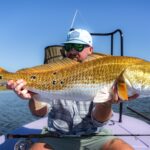
Louisiana Bull Reds Up for Harvest Again: H.B. 604 Must Not Pass
Photo Credit: Carter Abramson | Trevor Johnson Every now and then, we encounter something so
In January, Louisiana experienced an unprecedented winter storm that shattered long standing snowfall records across the state. On January 21st, Baton Rouge recorded 7.6 inches of snow, marking the city’s snowiest day since records began in 1892. New Orleans also saw its snowiest day on record, with up to 10 inches blanketing the city, far surpassing the previous record of 2.7 inches set in 1963. Unfortunately, the legendary Louisiana bayou and its inhabitants were not spared from the effects of this storm either.
Many concerned fishing guides and recreational anglers sent us reports of devastating impacts to Louisiana’s inshore fisheries – and we have seen dozens more on social media. It appears that many redfish and speckled trout could not withstand this historic drop to frigid temperatures. These species were left vulnerable as shallow estuaries and backwaters dropped below survivable temperature levels. The scale of impact appears regional, as different sections of the marsh have easier access to deeper water, enabling fish to retreat to safety. While winter fish kills are not uncommon, the scale of this event raises serious concerns about long-term impacts and the resilience of the fishery.
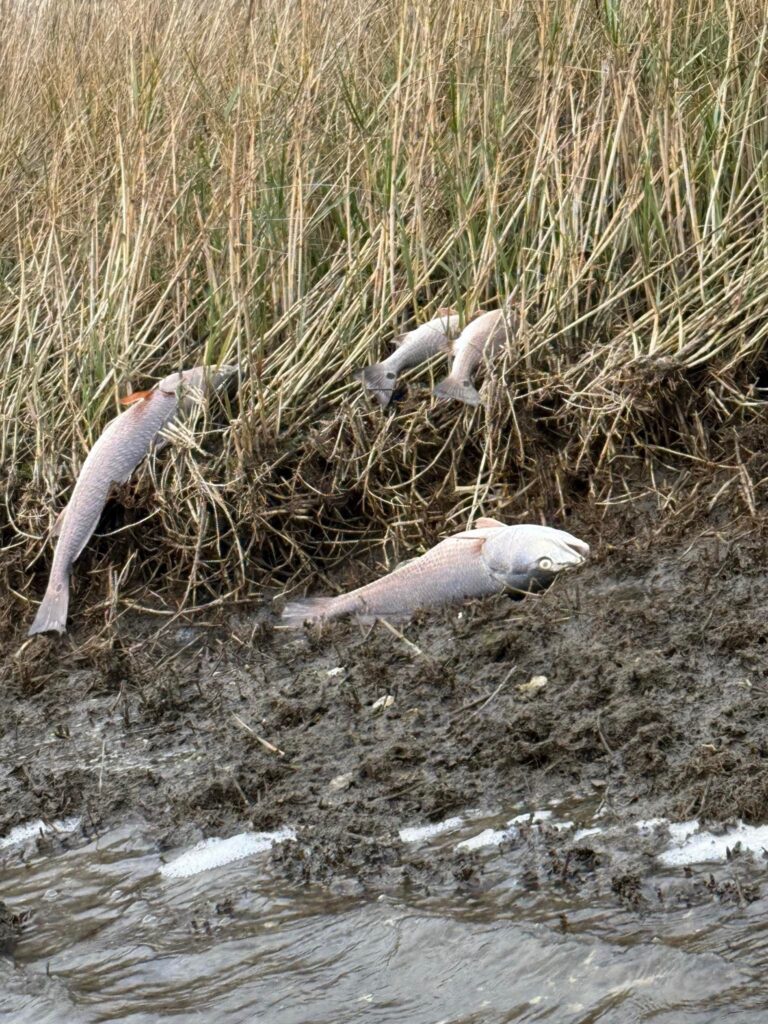
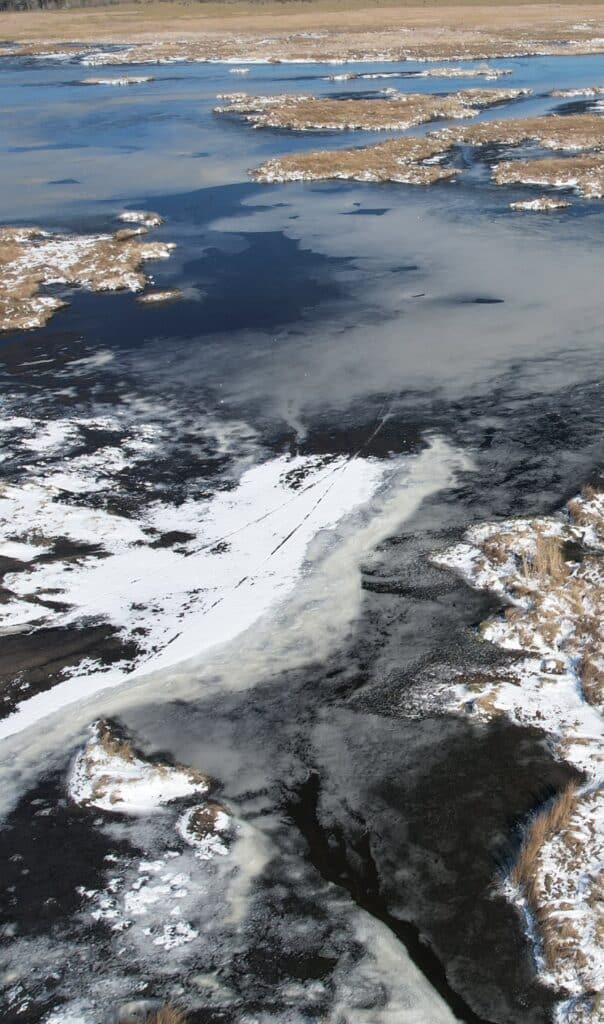
Red drum (redfish) and speckled trout are particularly vulnerable to prolonged cold snaps due to their affinity for shallow, estuarine environments, which can experience more rapid temperature fluctuations. Unlike deeper waters, where fish can retreat to more stable conditions, Louisiana’s marshes, bays, and tidal creeks can quickly become traps when cold weather strikes. Speckled trout, in particular, struggle in water temperatures below ~46°F, while redfish can tolerate slightly colder conditions but are still at risk when extended freezes occur. Cold-stunned fish become lethargic, lose their ability to evade predators, and often suffocate as their metabolism slows to dangerous levels.
This latest event in Louisiana echoes the catastrophic freeze that struck Texas in 2021, which led to the loss of millions of fish. Similarly, Florida’s snook populations suffered a massive mortality event during the record-setting cold of 2010, forcing an immediate management response to aid recovery. In both cases, it took years for these fisheries to rebound, underscoring the long-term impacts of extreme cold events. North Carolina experienced a devastating cold stun on trout a few weeks ago. The state agency implemented a dramatic action to give the fish a chance to recover. Due to recent cold stun events affecting seatrout, the North Carolina Division of Marine Fisheries (NCDMF) has enacted a temporary closure on both commercial and recreational harvest of the species. This regulation took effect at 5 p.m. on January 24, 2025, and will remain in place until at least mid-June. North Carolina emphasizes that the focus of their closure is to protect surviving fish, allowing them the opportunity to spawn during peak spawning months (May–June) before the fishery reopens.
Louisiana now faces a similar challenge, particularly with redfish, sheepshead, and trout populations. LDWF just finished stock assessments on black drum, sheepshead, and mullet. This complicates the issue greatly. In the recent stock assessment on trout in Louisiana, LDWF included a model that included a cold stun event. We urge LDWF to use their science to drive the response. The state can not afford to wait months to address this act of nature.
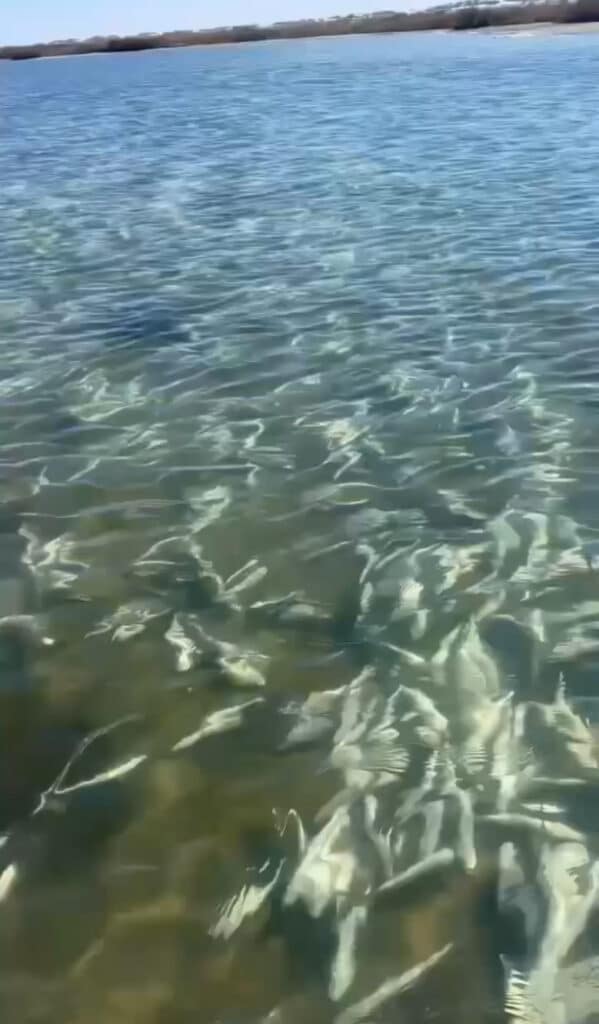
These repeated cold-induced die-offs highlight the urgent need for proactive fisheries management. Given the importance of redfish and trout to Louisiana’s fishing culture and economy, state officials will assess the scale of this mortality event, considering short-term and long-term responses to safeguard their natural resources.
State biologists and officials are currently in assessment mode, trying to gather all available information regarding the impacts of the freeze. We urge Louisiana outdoorsmen to report what they’re experiencing on the water. While some may be concerned about how this coverage could affect business demand, the reality is that events of this scale are significant and can’t go undocumented. A great example of effective stewardship is the Florida Guide community. Floridians have amplified the plight of their waters while successfully maintaining their status as an elite angling destination. Those who observe any significant fish kills can report them to the Louisiana Department of Wildlife & Fisheries, per their request below:
“Please provide your name, phone number, detailed location, approximate quantity and species, and their condition (dying, dead or decomposing). To report a fish kill, please call 800-422-2511 or click here.”
The voices of outdoorsmen are critical in times like these. As true stewards of their ecosystems, we witness firsthand the impacts of environmental events and can provide invaluable data to biologists and fisheries managers. This level of participation helps ensure the state has the best perspective of the fishery with the goal of working collaboratively to conserve it for future generations.
Drone imagery provided by Devin Denman of Louisiana Fishing Blog. Additional coverage of this historic freeze is available on his site by clicking here. Other imagery was provided by various anglers and guides throughout the state.

Photo Credit: Carter Abramson | Trevor Johnson Every now and then, we encounter something so

This past weekend, ASGA proudly sponsored the Dirty Carp Tournament in Louisiana — and no, you didn’t misread that.

After years of data pouring in from The Albie Project, advocacy, persistence, and support from
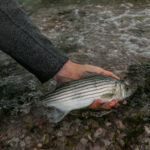
This morning, the Connecticut Environment Committee held a hearing on House Bill 6248, a bill
We rely on our members and donations to keep fighting for a sustainable tomorrow in marine conservation.
GIVE THE GIFT OF FISHERIES CONSERVATION THIS HOLIDAY SEASON. SHOP ASGA GOODS THAT FUND FISHERIES RESEARCH & ADVOCACY CAMPAIGNS
JOIN ASGA IN CALLING FOR CRITICAL MANAGEMENT ACTION AFTER YEARS OF SPAWN FAILURES & POOR MANAGEMENT.
By using this website, you agree to our use of cookies. We use cookies to provide you with a great experience and to help our website run effectively. To learn more, please review our privacy policy.
One Response
You’ve covered the topic very thoroughly—great work!